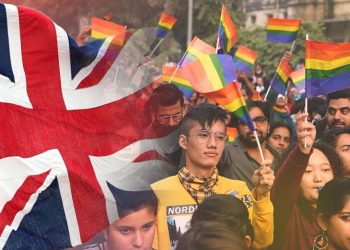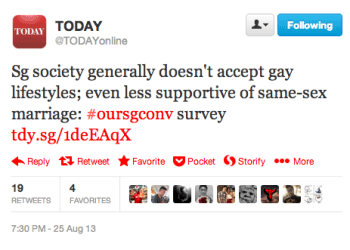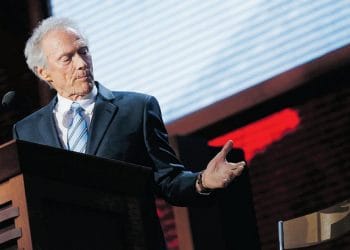Towards the end of Channel NewsAsia’s Talking Point show on the new MDA licensing regime, a caller asked Acting Minister of Manpower, Tan Chuan-jin, to confirm on air that blogs would not be subjected to licensing in the future.
The Minister repeated his mantra of the show: the regulations are meant to cover news sites, and not blogs. Unless, of course, the blogs evolved into news sites.
But when does a blog evolve into a news site? When there are so many websites that host both reports and commentary, and when even the mainstream media is moving towards blogging (just look at Singapolitics), how do we decide what a news site is?
Tan Chuan-jin had no satisfactory answer for that. All he could do was repeat that the regulations were meant to cover news sites, not blogs. Unless the blogs became news sites.
Many of us tuned in to Talking Point to see how a government minister was going to defend the licensing scheme and the way it had just been pushed through without consultation or parliamentary debate. Judging from the online reaction on Twitter and Facebook, I’m not the only one still in the dark.
The wrong targets?
Since the whole uproar over the licenses began, government ministers have defended the new regulation by referring to distasteful or incendiary material, such as videos of the Woolwich beheading, or the Innocence of Muslims film that sparked unrest. Their argument was that it was important to make sure that there were regulations in place to deal with such content.
Yet, as pointed out by the Breakfast Network’s Bertha Henson, such material never appeared on the 10 websites the MDA has issued licensing notifications to. This means that government reassurances of sticking to the list of 10 hold no water – if preventing disturbing, irresponsible and distasteful media content was the goal, why regulate the websites that don’t post them? Is the licensing scheme so poorly conceived that it can only reach the wrong targets?
If the government was really concerned about regulating such content, they would have to extend the licensing regime beyond the list of 10. They would have to target the platforms where such material surfaces – the likes of Reddit, 4chan, YouTube, forums and yes, blogs.
What does that say about their assurances that blogs won’t be touched?
Why so kancheong?
When asked about the $50,000 performance bond – the requirement that could kill any grassroots volunteer-run blog or website – Tan said that there were “different details” that could be worked out by the MDA.
What are these “different details”? Is the MDA going to provide a helpful list of legal moneylenders that bloggers can approach should they be in need of a license? Or are they going to create some closed-door, opaque process where webmasters can enter into negotiations to discuss the terms of their licensing requirements, or haggle down the $50,000 price? Surely that would not be a desirable situation?
If the MDA has not worked these “details” out yet, then why was there such a rush to implement this new scheme? Why could they not have waited till the next Parliament sitting in July, or at the very least carried out some public consultation?
The MDA’s ‘fewlings’
Many of the questions asked on Talking Point had to do with the extremely broad definition of a “Singapore news programme”:
A “Singapore news programme” is any programme (whether or not the programme is presenter-based and whether or not the programme is provided by a third party) containing any news, intelligence, report of occurrence, or any matter of public interest, about any social, economic, political, cultural, artistic, sporting, scientific or any other aspect of Singapore in any language (whether paid or free and whether at regular interval or otherwise) but does not include any programme produced by or on behalf of the Government.
The questions came back again and again to this: with such a vague definition, who gets to decide what is or isn’t a news site? Who gets to decide who needs a license?
When asked why The Online Citizen has not been licensed, Tan said that the MDA did not “feel” that TOC was a new site. He later added that he did not “think” that blogs were to be considered as reporting news.
If that was truly their intention, why did they not reword the legislation to be more specific? Why do we have to depend on how the government “thinks” or “feels”? Why should they get such latitude to exercise their discretion?
As I wrote in this blog post for Yahoo! Singapore, do we really trust the government with so much power to decide?
It’s time to withdraw
As the show progressed one thing became increasingly clear: the MDA licensing regime is a hopelessly confused mess and no one – not even the government – knows how to explain it.
If it’s meant to curb the posting of objectionable, vulgar or explicit material, it’s going to fail because it’s targeting the wrong websites. And, as both PAP MP Baey Yam Keng and Minister Tan Chuan-jin have admitted, there is no way you can regulate the whole Internet.
The government is also unable to explain to a satisfactory degree of how this licensing is going to be extended beyond the current 10 websites, because it doesn’t even know where the line between a blog and a news site is. If the government cannot even articulate how a blog can morph into a news site, how can it implement this licensing scheme consistently?
In the face of such a disaster – and not just in terms of PR and communications – it’s pretty clear to me what should happen next: the government should withdraw this lame regulation immediately and get on with the job of engaging its citizens. Properly.
To express your opposition to the MDA licensing regime please sign this petition.
If you have a blog/website, do consider joining our online blackout by redirecting to http://www.freemyinternet.com for 24 hours on 6 June (0000 – 2359).
And of course, attend the protest at Hong Lim Park on 8 June!







